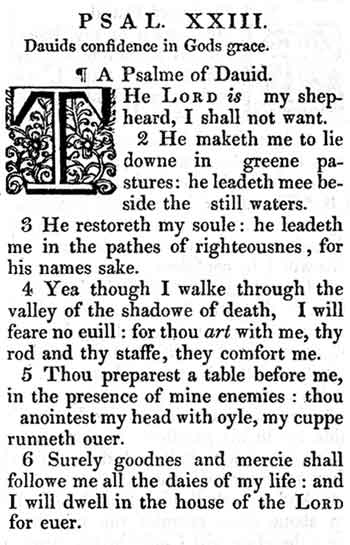One vital part of the teaching program of most churches is missing: that of teaching believers how to enjoy their Bible. Most seem content to have followers in the Sunday service as spectators to a show plus some points to help them in the coming week, and don’t forget to come next Sunday! I want to demonstrate how easy it is to get daily encouragement from reading your own Bible.
Possibly the most well-known and constantly used passage is Psalm 23, written by David. It is almost universally used at funerals, the hymn versions are also favorites, and I would guess a majority of church attendees could recite it from memory. It is really best discussed at Easter, as it follows Psalm 22, the psalm of the Cross. I even found my notes when I preached on verse 1 on Palm Sunday in 1965 and 1982 (yes, Pete and Repeat!). Let’s use it to show how to enjoy your Bible without a college degree! The first suggestion is this: simply read what is written!

Psalm 23 from the 1611 KJV
Notice first that the statement is about a relationship between “The Lord” and “me,” that is you, the reader. And this relationship continues through the six verses of the psalm. “He makes me…,” “he leads me…,” “he restores my…,” and so on. Underline the me’s, the my’s, the I’s. Put a circle around “The Lord,” the he’s, the thy’s, the thou’s (or you’s and your’s, depending on your translation). As D.L. Moody said, “Never buy a Bible you can’t write on.”
Let us not pass over the present tense “is” in this phrase. I just read an autobiography that spoke of the writer’s parents having “a profound faith in an ever-present God.” “Is” speaks of just that. Christianity that is not present tense is the greatest curse this world has known. Today, as you read this, Christian, “The Lord IS my Shepherd.” It is not only present tense, it is personal. He is a Shepherd to me! Say it over and over again. “The Lord IS my Shepherd.” Right at this moment it is true, and right through this day and night it remains true. If you tread on an ant or kick the cat, it is still true! There is no “if” nor “but” nor even “I hope so.” “The Lord IS my Shepherd.”
Now let us think for a moment about to whom this phrase refers. Since it is in the Old Testament, “The Lord” is not Jesus Christ but “the God and Father of our Lord Jesus Christ.” Perhaps the notes in your Bible might tell you the word translated is “Jehovah-Ro’i,” one of the compound names of God in the Old Testament. However, even without that understanding we can still get a bucket of truth from this one phrase.
At the end of the phrase in the English translation we have the word “Shepherd.” Surely everyone knows a shepherd is a person who looks after sheep, so God is looking after me. A shepherd takes his sheep where there is food and water. He protects them from predators. He knows each one by name. He sleeps with them at night, after counting them to check they are all gathered together. God is looking after me right now.
The first verse in its completeness reads “The Lord is my Shepherd; I shall not want” (KJV, etc.) or “I shall not lack” (AMP). The reason I shall not want is because “The Lord is my Shepherd.” I might want otherwise, but I won’t now that the Lord is my Shepherd, for he supplies all my need. So verse 1 is present tense, it is personal, and it details God’s provision. The rest of the Psalm describes how he looks after us and gives examples of circumstances in which we should remember this.
Stop and read the Psalm 23 in your favorite translation or paraphrase right now, and then give Him thanks for His love and care for you.



Blessings Peter,
Your initial statement of thanking us (believers) for letting us into your(s) life again warmed my heart.It IS comforting to know He is personally taking care of us as we acknowledge and allow Him to shepherd us in the ‘now’ of his present tense care and love for us
Arnie
Thanks, Arnie. I want to hold that thought for the rest of my life.
I thank God for his love and care in family, teachers like you Peter, and in life.
Thank you for reminding us of the present God.
Thanks, Maxine. You are a beloved sister in the Lord. Yes, He’s right on your case right now! Our love to you and Cody.
Thanks. God IS so GOOD and for that I am so very thankful every day. His Precious Word is my most precious possession and I love it. I LOVE reading His Word and endeavouring to do what it says to me. thank you again. Much appreciated.
Thanks, Judith. Yes, He’s present right there in your current battles too! We are more than conquerors because we have the ultimate conqueror within us, and he wins every time! Glory!
Thanks for the insight on this most inspiring section of God’s Word. You truly are the master teacher and I keep learning from you!
I have been emphasizing relationships, so this will fit beautifully.
Agape,
Bob
Thank you for such revealing word of encouragement may God bless you
Greetings Peter:
Years ago the Spirit gave me a dream and in the dream I was shown a larger green grass and in the center of the valley was a row of 7 lions and I have learned they all were filled with the fullness of the WISDOM OF ABBA DADDY FATHER!!!